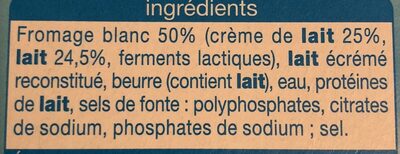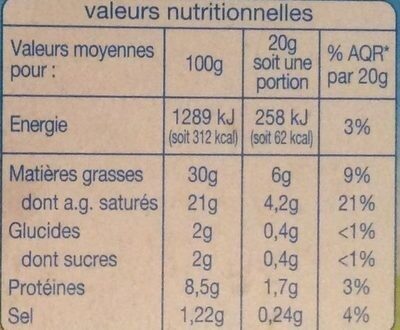12 p'tits carréscrémeux - Auchan - 0.24 kg
This product page is not complete. You can help to complete it by editing it and adding more data from the photos we have, or by taking more photos using the app for Android or iPhone/iPad. Thank you!
×
Some of the data for this product has been provided directly by the manufacturer AUCHAN APAW.
Barcode: 3596710406449 (EAN / EAN-13)
Common name: Fromage blanc fondu
Quantity: 0.24 kg
Packaging: Metal, Recyclable Metals, Aluminium, Cardboard, Fresh
Brands: Auchan
Categories: Dairies, Fermented foods, Fermented milk products, Cheeses, Spreads, Salted spreads, Cheese spreads, Melted cheese
Labels, certifications, awards:
Green Dot, Triman

Origin of ingredients: France
Manufacturing or processing places: EMB 39300F
Traceability code: FR 39.300.002 CE - Lons-le-Saunier (Jura, France)
Stores: Auchan
Matching with your preferences
Environment
Carbon footprint
Packaging
Transportation
Report a problem
Data sources
The manufacturer AUCHAN APAW uses Agena3000 to automatically transmit data and photos for its products.
Product added on by openfoodfacts-contributors
Last edit of product page on by org-auchan-apaw.
Product page also edited by autorotate-bot, beniben, cailluyere-jonathan, chevalstar, date-limite-app, dieteticienne, geodata, kiliweb, manu1400, packbot, quechoisir, roboto-app, segundo, teolemon, yuka.FZR_OvLQGuMmHdzS4I4S1TThPezxIvJzMVsyog, yuka.WVlNRkVmNDcvK0VWc1BRaDVFN055czl6NExXWURUT1JGZGhMSVE9PQ, yuka.YXJrQk9yd3NuY1lhcE1OZzRoVDhvNDRzNGJhYlRFQ3BCUHNXSWc9PQ, yuka.YlB3WUg1UXUvZWdsZ05zZThCQ0kvOGx5eDVud1hVT1pOTlZMSUE9PQ, yuka.ZG9jK0xxOE5yL1VMeDhVRG9pTHQrdkZPN1lDVGYySzVDdGd1SVE9PQ, yuka.sY2b0xO6T85zoF3NwEKvlh11dvfOoGz9Mzr5yVSJyuqxfq3ZYYhJ7ZfmY6s, yuka.sY2b0xO6T85zoF3NwEKvlkYaePHXhgL1Dy3Rl2ah5e6CCaDwR8543qjFF6s.











